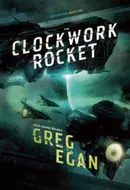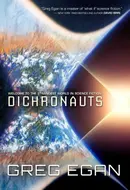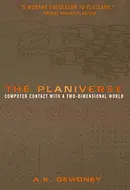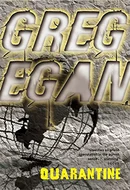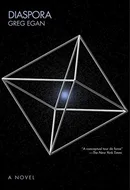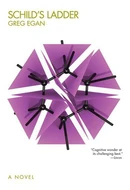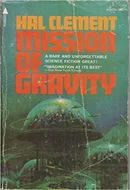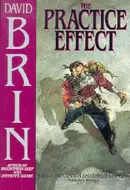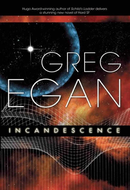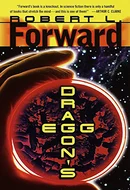Books Like...
Set in a strange universe with fictionalized physics, "The Clockwork Rocket" by Greg Egan follows the journey of Yalda as she navigates a world facing extinction. The book combines elements of intense drama, emergency space travel, and intricate physics theories, challenging readers with a unique blend of science and storytelling.
Egan's writing style delves deep into the physics of the orthogonal universe, offering readers a rich and detailed exploration of a world where physical laws are fundamentally different. Through the character of Yalda, the book delves into the discovery of rotational physics and the societal implications of such knowledge, all while building a narrative around the construction of a clockwork rocket to save the planet from a looming disaster.
If you liked The Clockwork Rocket, here are the top 77 books to read next:
- #1
Greg Egan creates a world in his novel 'Dichronauts' that is described as weirdly fascinating, with two space dimensions and two time dimensions, making it hard to comprehend for some readers. The novel is a story of exploration in a setting that is both less didactic and much stranger than 'Flatland'. The author's clear and succinct prose style is appreciated by readers who are familiar with Egan's previous works, making it a solid indicator of whether one would enjoy this book.
By the time they arrived the sky was bright, and all the vantage points to the east and west of the museum were taken, occupied by a good-natured but impenetrable throng. So they sidled north into the... 'The Planiverse: Computer Contact with a Two-Dimensional World' by A.K. Dewdney is a fascinating fictional story about a college computer lab's accidental contact with a two-dimensional world. The plot follows the mystical quest of Yendred, a character from the two-dimensional world, as the readers learn about the physics, chemistry, and biology of a two-dimensional existence. The author provides intricate details and diagrams of how objects like steam engines and clocks could function in a two-dimensional world, making the narrative both educational and imaginative. Dewdney's writing style effectively uses 2D analogies to give readers a glimpse of what a 4D space might be like, creating a compelling and thought-provoking storyline.
is marketed as a computer-oriented fantasy in the tradition of 'Flatland,' offering readers a unique perspective on a two-dimensional world and its sapient creatures. Readers find the book to be well-written, engaging, and a great exercise for the brain, challenging them to think in 2D and expand their 3D vision. Despite some criticisms regarding loose ends and weak characterization, 'The Planiverse' is praised for its detailed world-building, interesting observations about 2D physics, and the effort put into exploring the intricacies of a two-dimensional existence. Overall, the book is described as compelling, interesting, and a favorite among readers who enjoy mathematical and imaginative narratives.
- #3
Greg Egan's 'Quarantine' is a sci-fi detective story set in the year 2067, where the protagonist, Nick Stavrianos, investigates a kidnapping mystery in a world where Earth is quarantined by an impenetrable gray shield. The plot delves deep into quantum mechanics, eigenstates, and the implications of humans observing reality, all woven into a complex narrative that challenges the reader's understanding of physics and consciousness. Egan's writing style is described as a blend of hard science fiction and noir elements, with detailed exploration of futuristic technologies like nanobots for brain modifications and quantum computing.
Of course, nobody wants a sensitive call electronically decoded and flashed up on the screen of an ordinary videophone; even if the room isn’t bugged, radio-frequency spillage from the unscrambled sig... 'Diaspora' by Greg Egan explores a future where humanity has evolved into various post-human entities, such as robots, digital humans, and software societies, following an astronomical disaster that renders Earth uninhabitable. The story delves into complex themes like transhumanism, parallel universes, and the implications of individual autonomy in virtual reality. The writing style is described as heavy on scientific concepts, particularly in areas like particle physics and multi-dimensional mathematics, which may be challenging for some readers but ultimately contributes to a mind-blowing exploration of cosmic cataclysms and existential questions.
The conceptory was non-sentient software, as ancient as Konishi polis itself. Its main purpose was to enable the citizens of the polis to create offspring: a child of one parent, or two, or twenty – f...- #5
'Permutation City' by Greg Egan explores mind uploading, digital consciousness, parallel universes, artificial life, and the nature of reality. It delves into the consequences of creating simulated copies of humans, the evolution of intelligent life within virtual environments, and the blurring lines between real and virtual worlds. The writing style is described as exploring complex philosophical concepts, heavy on metaphysics and philosophy, and delving into hard science fiction territory with a focus on high-concept questions and moral dilemmas.
Maria Deluca had ridden past the stinking hole in Pyrmont Bridge Road for six days running, certain each time, as she’d approached, that she’d be greeted by the reassuring sight of a work team putting... - #6
Schild's Ladder by Greg Egan is a hard science fiction novel set 20,000 years in the future, exploring themes of quantum mechanics, transhumanism, and the manipulation of matter at a quantum level. The story follows a research team divided into Preservationists and Yielders, dealing with the aftermath of an accident at the future equivalent of the Large Hadron Collider. The protagonist, Tchicaya, navigates the slow-motion destruction caused by a false vacuum expanding throughout the universe, while interacting with computationally augmented post-humans and delving into complex quantum theories.
Greg Egan's writing style in Schild's Ladder is characterized by intricate scientific concepts, such as quantum graph theory and relativity, presented in a detailed and thought-provoking manner. The narrative delves deep into the implications of advanced technology on humanity, exploring themes of identity, society, and the consequences of manipulating the fabric of reality.
Other patterns could propagate in a similar fashion, and their symmetries and interactions matched up perfectly with the known fundamental particles. Every graph was still just a graph, a collection o... - #7
Hal Clement's 'Mission of Gravity' is a hard science fiction novel that explores the consequences of a rapidly spinning, high-gravity planet called Mesklin. The story follows a human explorer and the native Mesklinite captain as they collaborate to retrieve a lost science probe from dangerous conditions that only the locals can navigate. The novel delves into the detailed world-building of Mesklin, showcasing the interactions between humans and the unique inhabitants of this alien planet.
All rights reserved. No part of this book may be reproduced in any form or by any electronic or mechanical means including information storage and retrieval systems without permission in writing from ... - #8
'The Practice Effect' by David Brin is a science fiction novel that introduces readers to a world where objects improve with practice and use rather than deteriorate. The main character, Nuel, finds himself in this world and must navigate through a series of adventures involving a civil war, a princess in need of rescuing, and a villainous baron. The story combines elements of traditional fantasy with science fiction, offering a unique take on the concept of entropy and the practice effect. Brin's writing style is described as engaging, witty, and humorous, with a focus on character development and problem-solving through technology.
At the front of the dimly lit conference room, the portly, gray-haired director of the Sahara Institute of Technology paced back and forthstaring at the ceiling with his hands clasped behind his back... - #9
'Incandescence' by Greg Egan is a hard science fiction novel that explores themes of immortality, advanced civilizations, and the pursuit of knowledge. The book intertwines two storylines: one following a genetically engineered race living in extreme conditions near a black hole, and the other focusing on a far future human investigating the origins of DNA-based life in the galaxy's central bulge. Egan's writing style is heavily focused on scientific concepts, with detailed explanations of physics and orbital mechanics playing a central role in the plot development.
Rakesh was affronted; if he'd considered this to be information that any stranger wandering by had a right to know, it would have been included in his précis. After a moment's reflection, though, his ... - #10
"Dragon's Egg" by Robert L. Forward is a classic hard science fiction novel that explores the emergence of an intelligent alien civilization living on the surface of a neutron star. The story follows a space expedition from Earth that makes contact with the Cheela, a species evolving at a rapid pace due to the extreme conditions on the neutron star. The narrative delves into the complexities of interacting with a civilization living on a different time scale and showcases the author's detailed scientific worldbuilding. Despite some criticisms about the character development, the book is praised for its unique concept, engaging plot, and the fascinating exploration of alien life forms.
Buu lay in his leafy arbor nest and looked up at the stars in the dark sky. The hairy young humanoid should have been asleep, but his curiosity kept him awake. A half-million years in the future that ...
